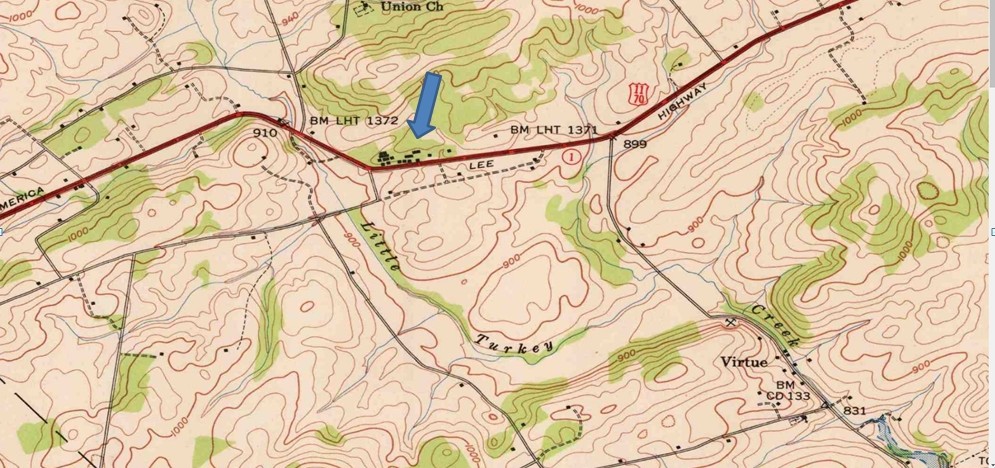With the holiday travel, New Year’s festivities and celebrating with libations among friends, much can be said and remembered of local watering holes in the Concord area. Some of the establishments mentioned here will be familiar to the Concord Farragut community; however, others will only be a memory to the older generations.

A newspaper ad from January 1824
In 1787, David Campbell founded a frontier station to house and to protect early settlers from the threat of attacks by Native Americans. The station which was used as an inn and a store soon came to be known as Campbell’s Station. By 1824, David Campbell sold 500 acres to Samuel Martin who became quite the entrepreneur.
It is thought that Martin built the brick building on the corner of Kingston Pike and Campbell Station Road which is today known as the Avery Russell House. It should be noted, however, that an archeological study by the town of Farragut indicates that the core of the house was most likely originally built by David Campbell’s son, John.
The brick building and David Campbell’s blockhouse station became a tavern and inn which Martin named Campbelton. He published an advertisement in the “Knoxville Register” for many items that he planned to market, which included “20,000 gallons of good whiskey in new barrels, each not to contain more than 36 gallons.”
Kingston Pike was a simple trail that was well traveled and Campbelton had become an important trading post which included a post office as well as the tavern. Historical documents relate that as many as 60 families at a time stayed in the house and cabins on the property which included several famous visitors. Martin was good friends with President Andrew Jackson and they shared an interest in horse racing. It is said that President Jackson stayed at the inn on numerous occasions as well as Louis Philippe, King of France (reigned 1830-1848).
The historical brick house has entertained many a traveler and in the last 150 years it has housed six generations of the Russell family, the last inhabitants of the residence before it was sold to the town of Farragut.
No doubt the walls of another tavern could relate interesting tales and hair-raising stories, however, descendants of the Rose Hill Tourist Court are still living in this area, so it’s probably best to leave their names anonymous. Rose Hill Tourist Court was located on a sharp curve on the left heading east toward Farragut on Kingston Pike at the vicinity of Old Stage Road. The Rose Hill property would have been to the driver’s left where Fox Den residents live now. Locals often referred to this stretch of road as “Rose Hill Curve.”
In addition to several cabins at the court, there was a small store called “Whitie’s Grocery Store.” The roadhouse combined with the nearby store presented a convenient place for the gypsies to stay and stock up when they made their annual trek through East Tennessee. Residents kept a close eye on livestock and possessions and were relieved to see them hurry on their way.
The tourist court existed well after prohibition but Knox County remained dry. Resourceful locals improvised and made their corn from a jar. Suffice it to say, Rose Hill was no place for children as libations were sold out the back door in paper sacks. Newspaper articles from 1938 tell of a local constable who was shot there and survived, taking the assailant to trial. Rose Hill continued to be the lively tavern until well into the sixties.

The Frontier House
This article would be remiss if it did not mention The Frontier House which closed a few years ago. In stark contrast to the other places as written about, the Frontier House was Concord/Farragut’s place to meet and greet. Owned by Charlie and Faye McCarter, one could always enjoy the best Charlie burger in town and celebrate with friends in a warm community environment.
Today, the Concord/Farragut community has a plethora of eating establishments that offer alcoholic beverages; however, Tennessee is still a dry state by default. Counties must authorize the sale of alcohol in order for it to be legal and subject to state liquor laws. And those ’shiners from the past that faced jail and harsh penalties now find that same corn in a jar is being bottled, taxed and sold in big box stores.
Readers interested in additional history of the Avery Russell house will enjoy reading a report prepared for the town of Farragut: Preliminary Archaeological Investigations of Site 40KN221, The Campbell’s Station Inn/Avery Russell Site, Farragut, Knox County, Tennessee by Valerie E. Altizer. The report is available on the town of Farragut’s website.
Mona Isbell Smith is a retired computer systems analyst who enjoys freelancing.

